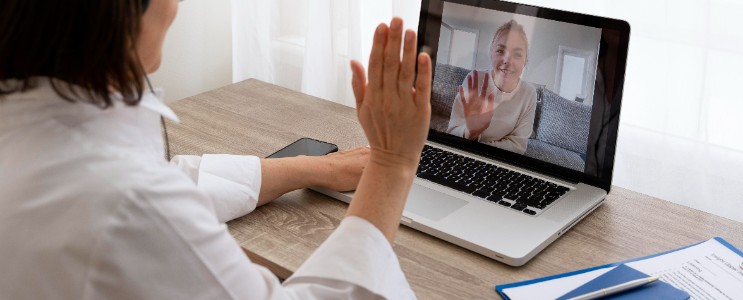
Teaching your Teen to be Responsible with Social Media

Social media touches nearly every aspect of teens’ lives today. It’s a source of entertainment, social interaction, news and more for many teenagers. While social media can have some positive effects, it also can come with potential risks. Too much time spent on social media can lead to the replacement of in-person social interaction, cyberbullying, internet addiction and a host of other issues. As parents, being aware of these risks and talking to your teen about how to avoid them can help ensure they’re using social media in a healthy way.
What do Teenagers Say About Social Media?
Teenagers have mixed feelings about social media. According to the Pew Research Center, 88% of teens say they have witnessed people be mean on social media and 15% of them have experienced some form of online harassment. However, a significant number of teenagers also reported social media makes them feel included (71%) and confident (69%). A study conducted during the pandemic revealed social media had a positive impact on mental health and resilience. Research reveals social media platforms often offer acceptance and a sense of belonging and help the youth connect to supportive communities. Physical fitness and health can also improve with social media use in some studies.
Social media can be a place where kids learn important life skills, like empathy and how to connect with others. It can also be a place where teens may have negative experiences, like cyberbullying or feeling left out. It is important to strike a balance with social media use, and this can be different for each person. Here are some ways parents can support their teen’s healthy social media use:
1. Get Involved and Stay Involved
The best way to know what your teen is doing online is to get involved. Talk to them about the sites they use and why they like them. Get your teen involved and create family social media rules like designating screen-free times or zones in the house.
2. Set Limits
While it’s important to be involved, you also need to give your teen some space. If you try to micromanage their social media use, it may backfire. Instead, set clear limits on how much time they can spend online each day. You might also want to consider setting limits on specific sites or activities. For example, you might not want them to use social media during homework time or after bedtime. Most social media sites have privacy settings which allow you to limit who can see your teen’s posts. You should also talk to your teen about what they post online. Remind them once something is posted, it’s out there for everyone to see.
3. Be a Good Role Model
If you want your teen to use social media in a healthy way, you need to set an example. Be thoughtful about the way you use social media yourself. Avoid oversharing personal information or engaging negatively with anyone.
4. Encourage Positive Social Media Use
Leveraging social media for good can be a great way to encourage your teen to use it positively. Help them find ways to use social media which are productive and beneficial. For example, they can use social media to stay connected with far-flung friends and family, follow their favorite news sources or support a cause they care about.
5. Discuss the Dangers of Social Media
Talk to your teen about the dangers of social media, such as cyberbullying, internet addiction and sharing too much personal information. Preparing your child for the potential dangers they may encounter online can help them avoid negative experiences. And it’s also as important to make sure your teen understands their own behavior when it comes to comments they make, posts they publish. A way to help them is to show them that the online and offline worlds are not exclusive, people can get hurt.
6. Help Them Find a Balance
Teens need to find a balance between social media and the rest of their lives. Help them set aside time for face-to-face interaction, outdoor activities, hobbies and other important pursuits. Encourage them to use social media as a supplement to their offline life, not a replacement for it.
7. Keep the Lines of Communication Open
Make sure you have an open line of communication with your teen about social media and any other issues in their life. Let them know they can come to you with any concerns or problems they have.
8. If you find yourself “ following” your teen on social media
It’s important to remember that privacy is important for teenagers, and their self-esteem may be fragile. Keep any comments you may have on their posts to a conversation you have with your teen face to face, and refrain from commenting online. It’s also a good idea to discuss posts and comments with your teen offline to show them that their online and offline selves are one and the same.
9. Seek Help if There Are Problems
If you feel like your teen is struggling to manage their social media use, don’t hesitate to seek professional help. A therapist or counselor can provide guidance and support. There are also many resources available online, such as articles, tips and support groups.
Social media will inevitably play a role in your teen’s life. As a parent, you can help them to use it in a healthy way. By getting involved, setting limits and being a good role model, you can support your teen as they navigate the world of social media.
Articles
Build your awareness and get inspired with our researched articles on how you can strengthen your well-being
Popular Topics
An OTP has been sent to the email address
provided.
Please check your Inbox and Spam folders.

What Would You Like to Speak with a Specialist About?
Mental Fitness Journey starts Now!
Chearful Connects you with Top-tier Qualified Wellness specialists for the Price of a cup of Coffee!

Next Steps
- A Client Team member will reach out to you to schedule a session with the most suitable specialist.
- You will receive an email with a 10% Discount Code* for your 1st session.
- We invite you to Explore the Platform & Sign Up today! *Upto a maximum of $10 discount on a session purchased




 3216 Read
3216 Read



.jpg)







.png)

.jpg)

.jpg)




.jpg)








































.jpg)


.jpg)
.jpg)
































